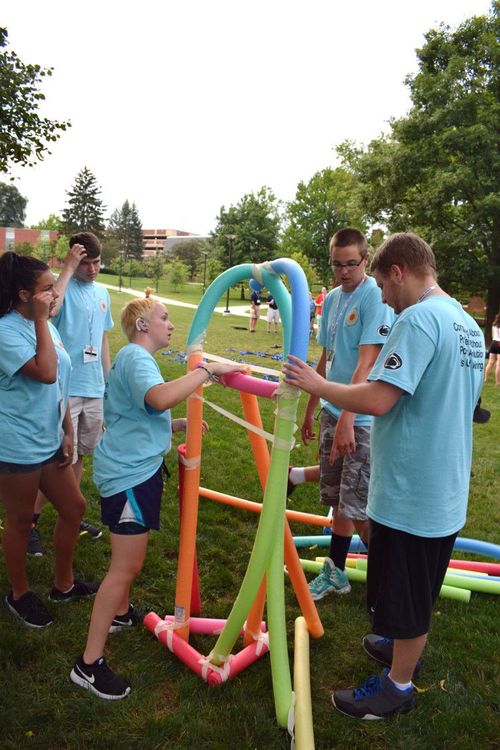Blog
-

Deaf and Hard of Hearing Academy, aids high school students’ transition to college
 7 Aug , 2017
7 Aug , 2017
Deaf and Hard of Hearing Academy, aids high school students’ transition to college
While Penn State students trekked across campus for summer session classes, a different group of students in brightly-colored blue shirts made their way to attend courses in vocational development, learning self-advocacy skills and team building.
From afar, it may seem strange to see students building structures from pool noodles on the HUB-Robeson Lawn, but to the participating students it’s this essential skill-building needed to enhance their future in college as deaf or hard of hearing adults.
Partly organized by Pennsylvania’s Office of Vocational Rehabilitation and the Penn State Department of Communication Sciences and Disorders , the first annual Deaf and Hard of Hearing Summer Academy took place at Penn State’s University Park Campus from July 7-21.
The Deaf and Hard of Hearing Camp isn’t the first of its kind to occur at Penn State however, as the Summer Academy for Students Who Are Blind or Visually Impaired has also been at Penn State for three years now. The cost for this program is free, due to funding from the Pennsylvania Office of Vocational Rehabilitation. “The DHH Summer Academy was a natural extension of OVR’s existing relationship with Penn State,” said Russell Goddard , the program director. “OVR was, and continues to be, impressed with Penn State’s willingness and commitment in making the two summer academies a success on their campus.” Goddard said in order to help students successfully transition from high school to college, the camp recruited disability-trained teachers and other experts from across Pennsylvania to teach the campers new skills.
“Our faculty participated in instructional sessions such as teaching the students how to read their audiograms, how to get assistance with hearing aid maintenance, and how to access audiological services when on a college campus,” said Diane Williams , head of the Department of Communication Sciences and Disorders at Penn State.In addition to creating courses designed to increase skills such as communication access and using assistive technology, the academy also offered fun, recreational activities such as bowling, rock climbing and canoeing.
Team-building activities like capture the flag and basketball also kept the students busy.
Goddard said without Penn State and the Department of Conferences and Institutes helping to coordinate classrooms, meals and computer access, the two-week academy would not be possible.
In the future, Goddard said he hopes to expand the duration to three weeks, and said he would like to expand the courses to include more science, technology, engineering, and math, as well as courses for independent living skills, like cooking.
“It was great to see their enthusiasm and how much [the students] enjoyed being with each other,” Williams said. “It was also great to learn about all they had experienced during the time they were on campus.”
Goddard said the best part of the academy, is seeing the high school students meet others just like themselves.“We have 500 school districts all across Pennsylvania, and it is very common for deaf and hard of hearing high school students to be the only one with a hearing loss in their school district or high school,” he said. “The Summer Academy brings them together so they know they are not alone.”
Goddard said he recently received an email from a parent who was happy to say how much her daughter’s self-confidence grew because of the program.
“This student didn’t know any sign language prior to the Summer Academy, and has never met another deaf student until now,” Goddard said. “I saw her bloom into her beautiful self in just two short weeks.”
Williams said although the academy for this summer has concluded, this program will once again run next year and parents can then sign up their children.
“This has been a labor of love for me and the 80 plus staff,” Goddard said. “Each and every one of them contributed to the success of the Deaf and Hard of Hearing Summer Academy — this could not have happened without them.”
Source: Daily Collegian
Image credit: PA Office of Vocational Rehabilitation





























































































































































































































































































































































































































































































































































































